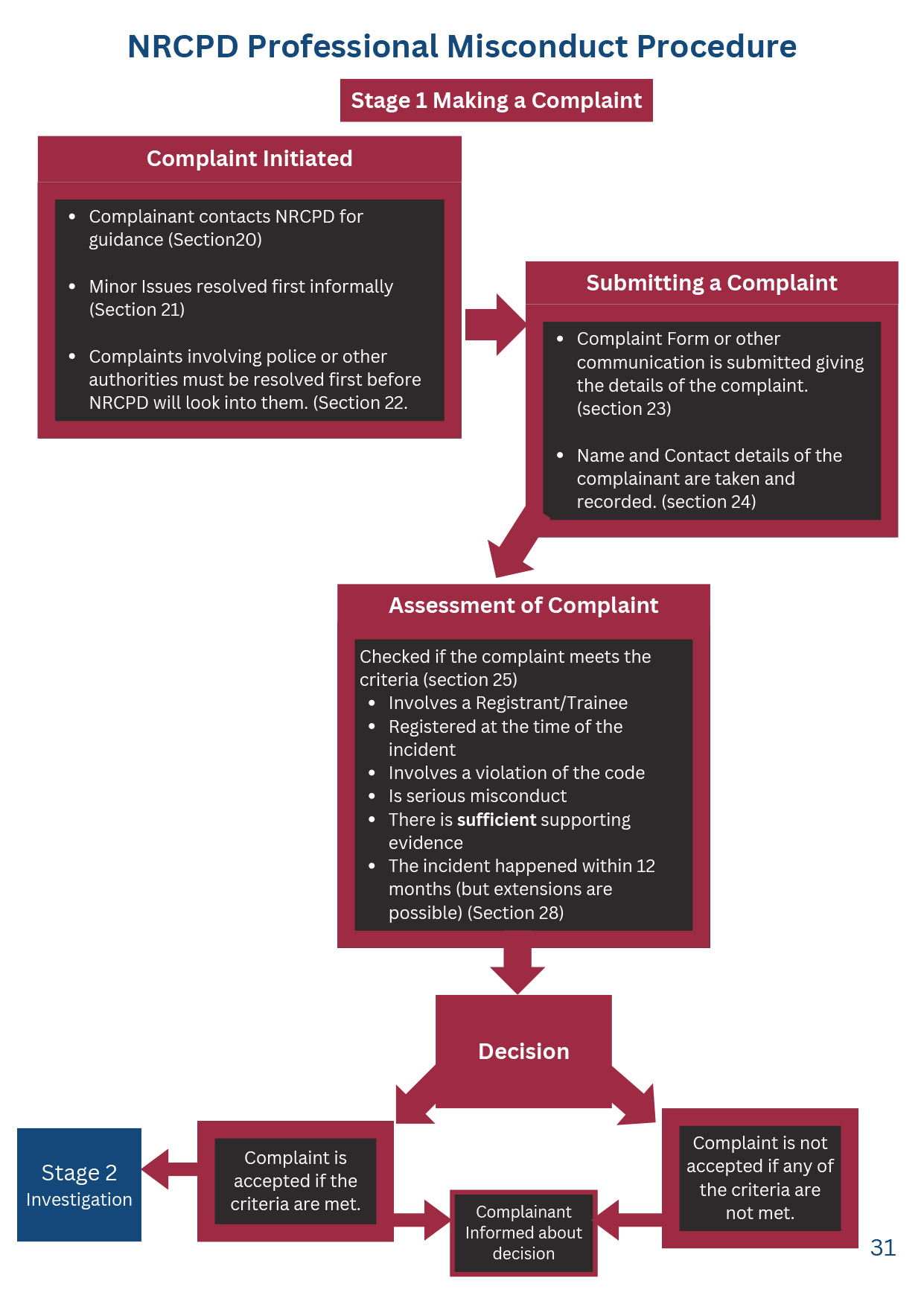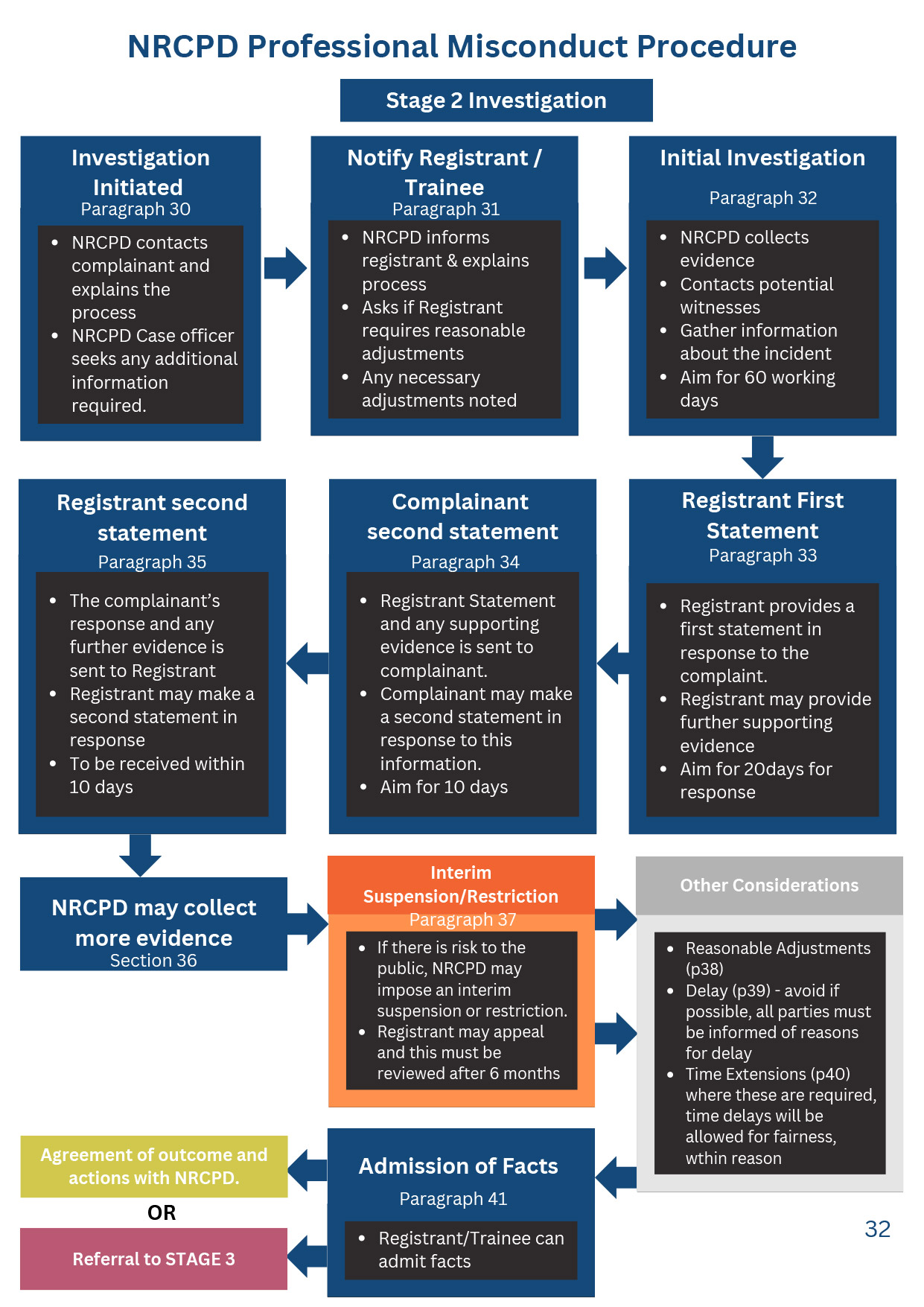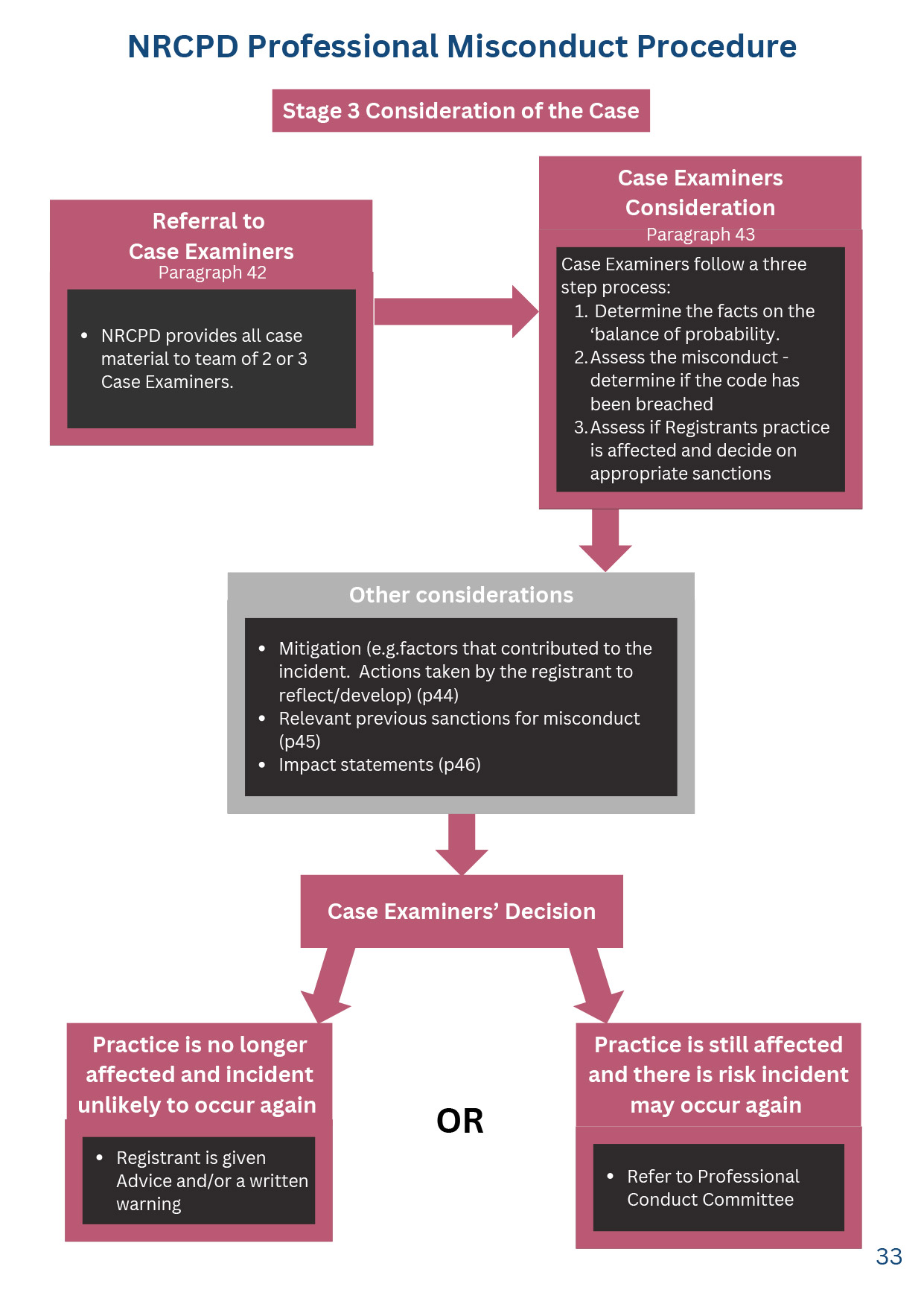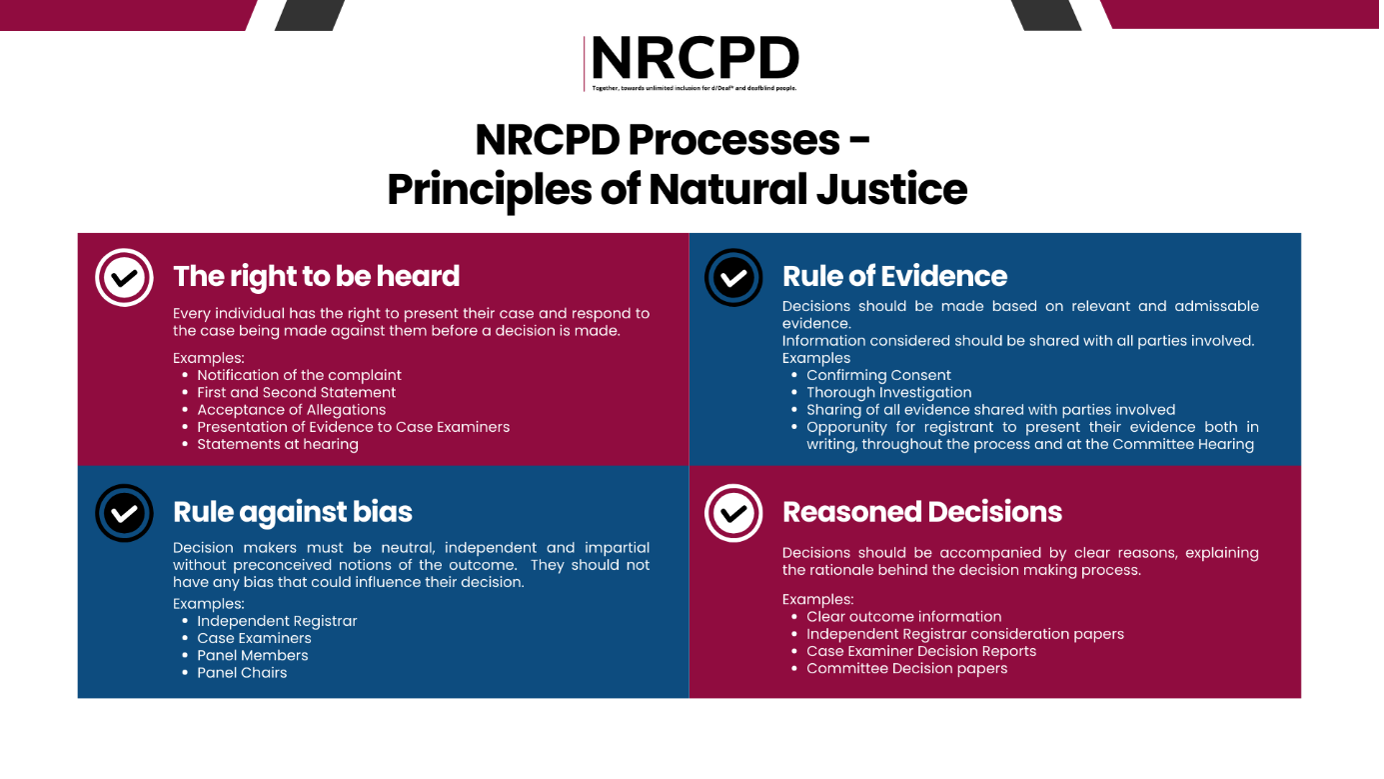We protect the public by setting standards.
Our Registrants and regulated Trainees must follow our Code of Conduct.
The Code says how Registrants and regulated Trainees should act as professionals. It says what is expected of them.
If you think that someone hasn’t followed the Code you should make a complaint.
It is important to make a complaint because it helps us to protect you and other people and helps the Registrant or regulated Trainee to improve their knowledge and skills. If you have a bad experience and don’t tell us, we can’t make sure it doesn’t happen to anyone else.
Stage One of the complaints process is the assessment stage. After you have made a complaint, NRCPD will assess the complaint to check if it meets certain criteria.
This assessment may take some time as we check the facts of your complaint and complete this stage.
If the complaint does not meet the criteria, the complaint will be closed.
If the complaint meets the criteria, it will be ‘accepted’ and moved onto Stage 2, investigation.
We will always let you know the outcome and our reasons for coming to that decision.

Stage 2 of the complaints process is the ‘investigation’ stage.
Once a complaint has been accepted NRCPD will contact all people involved in the complaint. This includes the Registrant or regulated Trainee, to let them know that a complaint has been made about them.
NRCPD will collect evidence and witness statements and will provide these to the Registrant or regulated Trainee to allow them to give their explanation of what happened.
NRCPD will also provide this information to the person making the complaint.
During this stage, the Registrant or regulated Trainee, is presented with the allegations and is given the opportunity to admit the facts. At this stage, they may come to an agreement with the Independent Registrar about how they can improve their practice and ensure that misconduct does not happen again.
If, during our investigations, NRCPD feels that there is a current or ongoing risk to the public, we may make an application for an interim order. This might be a suspension from the register or requirement for restricted practice, whilst we continue our investigations.
Before an interim order is given, it is NRCPD’s responsibility to explain to the Independent Registrar why we think there is evidence of a current or ongoing risk to the public.
This does not mean that a final decision has been made. It means that the evidence we have collected suggests that there may be a risk. The Independent Registrar will assess the evidence and decide if they agree with NRCPD’s view.
If this happens, the Registrant or regulated trainee can appeal against any decisions.
Throughout this stage, the Professional Conduct Team will be assessing the evidence and making sure that the complaint meets the required criteria.
There may be times where the evidence we gather shows that the complaint no longer meets the criteria. If this is the case, we will close the complaint.
We will always let you know how the investigation is progressing. We will always let you know about any outcomes to the case and explain our reasons and how we have come to those decisions.

Stage 3 of the Complaints Process is ‘Case Examiner Consideration’. At this stage, NRCPD will have gathered all of the evidence and prepared it for Case Examiners to look through and assess.
NRCPD will usually use two Case Examiners and make sure that they have the most appropriate skills and experience to consider the case.
Case Examiners will go through the evidence including the original complaint, any witness statements and supporting evidence, and the statements made by the Registrant or regulated Trainee.
Case Examiners will consider anything that might have contributed to the event, how it affected the person making the complaint and any work that the Registrant or regulated Trainee has done to improve their practice since the event happened.
When they have looked through the evidence they will make a decision if:
Sanctions will be given by Case Examiners where they decide that the Registrant or regulated Trainees conduct can be improved by training, professional supervision or another proportionate sanction. The aim of sanctions is not to punish the Registrant or regulated Trainee. The aim is to improve their conduct and make sure a similar thing does not happen again.
Sometimes, the evidence will show that there is a high risk that a similar thing will happen again in the future or that the complaint is complex. This can be for many different reasons. Where this happens, Case Examiners will decide that it is ‘in the public interest’ for the case to be heard by a full committee.
If this is the case, Case Examiners will make the decision to refer the complaint to a Professional Conduct Committee.
Case Examiners will write a ‘Decision Paper’. This will be shared with the Registrant or regulated Trainee and the person making the complaint. This paper will explain the outcome and how Case Examiners have reached this decision.

If you have a concern about the conduct of an NRCPD registrant, NRCPD recommend that it should be raised as soon as possible with the Registrant/Trainee, or with the organisers of the assignment, event or activity.
Every effort should be made to resolve problems informally.
You can contact the NRCPD Complaints team to discuss a concern about the conduct of a registrant.
The team will discuss your concern and will advise you of the possible options.
At that point, we will ask for your name and your consent for us to list your name within the complaint.
If you do not provide consent NRCPD is limited in what we can do to address things with the registrant. However, the concern may still be logged.
If you wish you get in touch with the Team, please visit our contact us page.
All NRCPD processes are based on the principles of Natural Justice.
This means that the processes are fair to all and that decisions are based on evidence and are made without bias.
This image gives more details about that. It also explains the different ways that NRCPD ensures that we follow the principles of Natural Justice.

An Acceptance of Facts is a formal acknowledgment by the Registrant that the events or conduct described did occur. It is not an admission of serious misconduct; rather, it confirms agreement with the factual basis of the concern so that the matter can be resolved proportionately.
An Acceptance of Facts is kept on the Registrant’s internal regulatory record for six years. This allows NRCPD to identify any repeating themes or emerging patterns should further concerns arise in the future, while avoiding unnecessary escalation where the original matter is capable of being addressed through early corrective action.
Advice to the Registrant is used when the issue does not meet the threshold for serious misconduct but shows that improvement, clarification, or further development is needed. Its purpose is corrective and supportive, not punitive.
Advice:
Advice is an effective and proportionate tool within a right-touch regulatory framework. It allows the regulator to address lower-level conduct concerns promptly, promote professional growth, and protect service users without imposing unnecessary enforcement action.
Advice is also held on the Registrant’s internal regulatory record for six years. This ensures appropriate visibility should similar concerns arise and allows NRCPD to demonstrate that guidance was provided and corrective steps were expected.